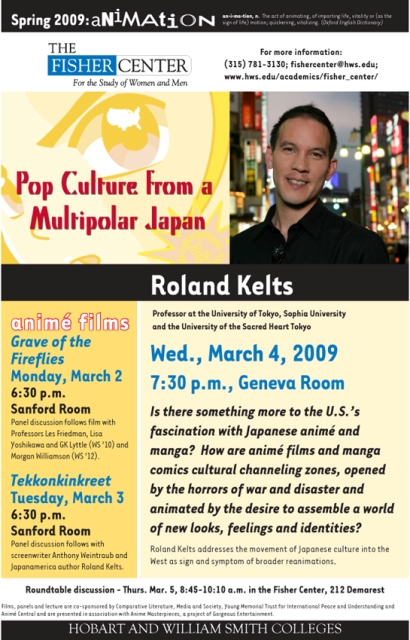Week Long Anime Events @ HWS: Pop Culture from a Multipolar Japan with Roland Kelts February 24, 2009
Posted by animatingthecyborg in anime, comics, culture, film, manga.Tags: Anthony Weintraub, campus events, Grave of the Fireflies, Pop Culture from a Multipolar Japan, roland kelts, Tekkonkinkreet
add a comment

Roland Kelts and Anime Masterpieces
Monday, March 2, Sanford Room, 6:30 p.m. Animé Film, Grave of the Fireflies
Taking place toward the end of World War II in Japan, Grave of the Fireflies is the poignant tale of two orphaned children, Seita and his younger sister Setsuko, who try to survive amidst widespread famine and the callous indifference of their countrymen. Some critics consider it one of the most powerful anti-war movies ever made. Animation historian Ernest Rister compares the film to Steven Spielberg’s Schindler’s List and says, “it is the most profoundly human animated film I’ve ever seen.”
Panel discussion follows film with Professors Les Friedman, Lisa Yoshikawa and Leah Shafer, and students.
Tuesday, March 3, Sanford Room, 6:30 p.m. Animé Film, Tekkonkinkreet
Tekkonkinkreet centers on a pair of orphaned street kids – the tough, canny Kuro (Black) and the childish but mysteriously intuitive Shiro (White) – as they deal with Yakuza attempting to take over Takara Machi (Treasure Town). Tekkonkinkreet is a pun on “tekkin concrete,” the Japanese term for reinforced concrete; it suggests the opposition of the concrete city against the strength of imagination. This film won the 2008 Japan Academy Prize for Animation of the Year, the Grand Prix award at the Anima 2008 festival, the prestigious Best Film Award at the 2006 Mainichi Film Awards, and was named the number one film of 2006 in the annual “Best of” roundup by the New York Museum of Modern Art’s Artforum magazine.
Panel discussion follows with screenwriter Anthony Weintraub, and Japanamerica author Roland Kelts.
Wednesday, March 4, Geneva Room, 7:30 p.m. Pop Culture from a Multipolar Japan, Roland Kelts
Is there something more to the U.S.’s fascination with Japanese animé and manga? How are animé films and manga comics cultural channeling zones, opened by the horrors of war and disaster and animated by the desire to assemble a world of new looks, feelings and identities?
Professor at the University of Tokyo, Sophia University and the University of the Sacred Heart Tokyo, Roland Kelts addresses the movement of Japanese culture into the West as sign and symptom of broader reanimations. With uncertainty now the norm, style, he argues, is trumping identity, explaining, in part, the success of Japanese pop and fashion, design and cuisine in the West. As Western mindsets encounter a rapid decline in longstanding binaries – good/evil, woman/man, black/white – Japan’s cultural narratives evolve in borderless, unstable worlds where characters transform, morality is multifaceted, and endings inconclusive. Animation allows an aesthetic freedom wherein these transformations and gender ambiguity may be given fuller play than in live action films. Nothing appears fixed. No surprise, perhaps, argues Kelts, coming from the only people to have suffered the immediate transformations of two atomic bombs and the instant denigration of their supreme polar father: the Japanese Emperor. Author of Japanamerica: How Japanese Pop Culture has Invaded the US, Kelts is also a contributing writer and editor for A Public Space and Adbusters magazines, and a columnist for The Daily Yomiuri. His articles have appeared in The Village Voice, Newsday, Cosmopolitan, Vogue and The Japan Times. He is the editor in chief of Animé Masterpieces, an anime lecture and screening series. Kelts divides his time between New York and Tokyo.
Films, panels and lecture are co-sponsored by Comparative Literature, Media and Society, The Young Memorial Trust for International Peace and Understanding, and Animé Central, and presented in association with Anime Masterpieces, a project of Gorgeous Entertainment.
Join us for a roundtable discussion session with Roland Kelts on Thursday 8:45-10:10 in the Fisher Center, Demarest 212.
